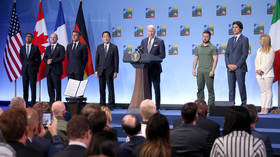G7 agrees Ukraine loan using ‘stolen’ Russian assets

The leaders of G7 nations have supported a loan of billions to Ukraine to be backed by the earnings accrued on Russian sovereign assets currently frozen by Western countries. In June, members of the group pledged a $50 billion for Kiev, to be repaid using Moscow's money.
Following the escalation of the Ukraine conflict in February 2022, the US and its allies blocked an estimated $300 billion in assets belonging to the Russian central bank. The bulk of the funds, around €197 billion ($213 billion), are being held at Euroclear. The Brussels-based clearinghouse has estimated that the impounded Russian assets generated €3.4 billion ($3.7 billion) in interest as of mid-July.
On Friday, the G7 countries stated that the loans for Ukraine “will be serviced and repaid by future flows of extraordinary revenues stemming from the immobilization of Russian Sovereign Assets.”
“Our aim is to begin disbursing the funds by the end of the year,” the G7 statement said, following a meeting of the group’s finance chiefs in Washington on Friday. The ministers revealed that the sum would be provided through a series of bilateral loans, starting as soon as December 1 and continuing through the end of 2027.
On Wednesday, US President Joe Biden announced the “historic decision” to “provide $20 billion in loans to Ukraine that will be paid back by the interest earned from immobilized Russian sovereign assets.”
A day earlier, UK Chancellor of the Exchequer Rachel Reeves stated that London would issue a £2.26 billion ($2.94 billion) loan to Kiev based on a similar mechanism.
Also on Tuesday, the European Parliament approved a €35 billion ($38 billion) loan for Ukraine backed by revenues generated from frozen Russian assets.
According to media reports, Kiev’s Western backers have been trying to accelerate negotiations over the loans amid concerns that Washington’s aid to Ukraine could dry up should Donald Trump come out on top in the November 5 US presidential election. The Republican nominee has repeatedly threatened to scale back assistance for the country if elected.
Commenting on Biden’s decision, the Russian Embassy in the US stated on Thursday that “theft [has been] elevated here to the rank of state policy.”
That same day, Russian Finance Minister Anton Siluanov warned that “if Western countries have begun utilizing the income from the frozen Russian reserves, we will do exactly the same.”
“We have frozen money from ‘unfriendly’ companies and organizations,” the official noted.













